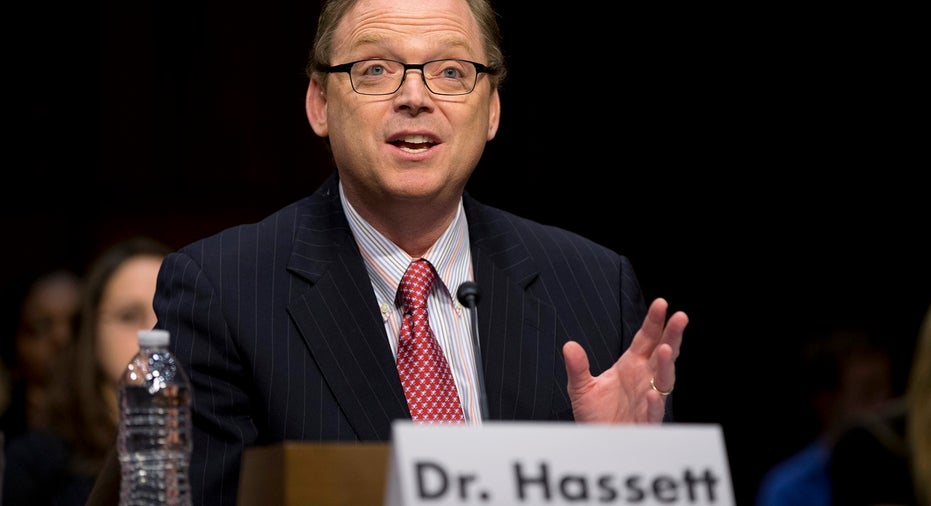Trump Taps Kevin Hassett To Be Chairman of the Council of Economic Advisers

President Donald Trump announced he will nominate Kevin Hassett, an expert in tax policy and one of the most prominent economists at the conservative American Enterprise Institute, to serve as the chairman of the Council of Economic Advisers.
The council's chairman is generally considered the chief economist of the White House. The White House announced its intent to nominate Mr. Hassett in a statement Friday afternoon.
Mr. Hassett emerged as a candidate for the job several months ago, but his nomination wasn't confirmed until Friday. The fate of Mr. Trump's Council of Economic Advisers had been uncertain. How much Mr. Trump cared about advice from academic economists also came into question when he announced that his cabinet would no longer include the council's chairman, as former President Barack Obama's had.
An economic advisory council announced during his presidential campaign had included only one Ph.D. economist, Peter Navarro, who has already been appointed to head a trade council for Mr. Trump.
Mr. Hassett, however, has a traditional pedigree for an elite academic economist. He received his doctorate in economics from the University of Pennsylvania, where he wrote a dissertation on applied econometrics--the difficult statistical work that underlies much economic research. He has published on a wide range of topics, with a particular focus on the benefits of tax cuts and the effects of economic uncertainty on business investment.
"He's not just a standard-issue really good economist, he's someone who knows how policy works," said Glenn Hubbard, who chaired the CEA under President George W. Bush and has published research with Mr. Hassett.
He said Mr. Hassett's expertise would be well-suited to the policy debates of the moment: "The tax changes being considered are really aimed at boosting investment, so I think Kevin is exactly the right person."
Mr. Hassett served stints as an assistant professor at Columbia University and as an economist at the Federal Reserve in the 1990s, before joining the American Enterprise Institute in 1997. He was an economic adviser to the previous three Republican presidential candidates: Mitt Romney, John McCain and George W. Bush.
He has written work supportive of free trade and increased immigration. His selection gives the mainstream GOP an ally in an administration consumed by tension between trade hawks and economic nationalists on one side and Wall Street moderates and establishment Republicans on the other.
Mr. Hassett has never been a polemicist, and has developed close working relationships with economists at many of Washington's prominent think tanks. In 2012, he partnered with Dean Baker of the Center for Economic and Policy Research, one of the more progressive think tanks in Washington, to write a New York Times op-ed about the "human disaster of unemployment .
Jason Furman, the previous CEA chairman, said on Twitter after Mr. Hassett emerged as a candidate, that he is "an excellent pick -- he is committed to research and dialogue plus understands policy/politics."
Mr. Hassett is perhaps best known for co-authoring a 1999 book titled "Dow 36,000." Mr. Hassett and his co-author, James Glassman, argued around the time the index first topped 10000 that stocks were "in the midst of a one-time-only rise to much higher ground -- to the neighborhood of 36,000."
The book's thesis was subsequently lampooned during the stock market crashes that began in 2001 and 2007. Despite the recent rally beyond Dow 20000, the market remains less than halfway to the book's target.
The CEA over the years has been staffed with some of the profession's most prominent academics. Before leading the Federal Reserve, Alan Greenspan, Ben Bernanke and Janet Yellen all chaired the Council of Economic Advisers. Few such economists were in Mr. Trump's orbit, as he had in large part campaigned on overturning the world order established by such academic heavyweights.
Mr. Trump also announced his pick of two top officials at the Office of Management and Budget.
Russ Vought, who served as a policy aide to Vice President Mike Pence when Mr. Pence was a member of Congress, was named deputy director of the budget office. Mr. Vought has served as a top official at the agency since the presidential transition, and he previously worked at Heritage Action for America, the lobbying arm of the conservative Washington think tank.
Neomi Rao was nominated as the administrator of the Office of Information and Regulatory Affairs, which is effectively the top regulatory czar in the executive branch with responsibility for coordinating major agency rulemaking. Ms. Rao is a professor at the Antonin Scalia Law School at George Mason University and directs the Center for the Study of the Administrative State.
Nick Timiraos contributed to this article.



















